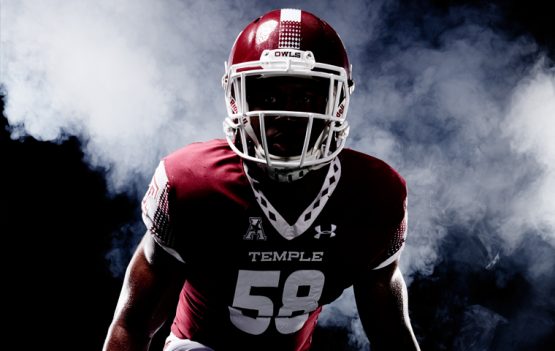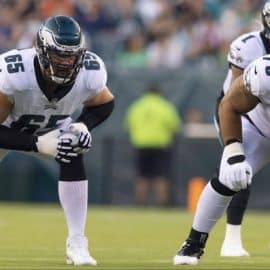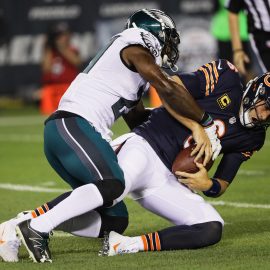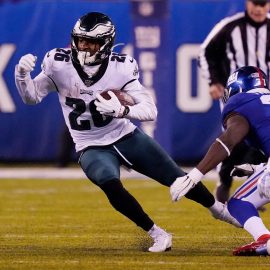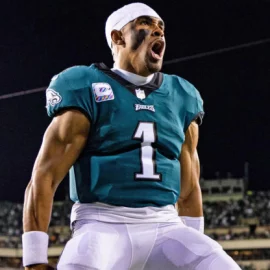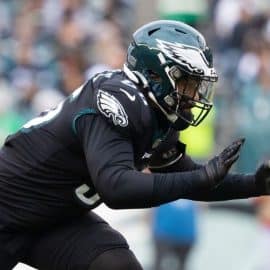That’s a shot of Eagles’ VP of Player Personnel Joe Douglas up there… Over the last ten years we’ve done a lot of clinics at the EYE, from blocking schemes to tackling technique to route trees and on and on… but we’ve never done a piece on the scouting department of the Eagles.
The notion hit me when I was perusing this little PR release from the Eagles media department yesterday:
“The Philadelphia Eagles have hired Ian Cunningham as the team’s director of college scouting, T.J. McCreight as a player personnel executive, Brandon Brown as the club’s assistant director of pro scouting, and Matt Holland as a pro scout. Additionally, Trey Brown has been named player personnel executive college/pro, Jim Ward was named the team’s Midwest area scout, and Katie David was named football operations coordinator.”
“We are extremely excited about our staff,” said vice president of player personnel Joe Douglas. “The group’s collective passion, character, football knowledge, and experienced eye for talent are great assets to the organization and the personnel department.”
Now it’s obvious that Cunningham and McCreight are old reliable cronies of Joe Douglas in his years with the Baltimore Ravens. But Matt Holland, Brandon Brown and Trey Brown have been bouncing around the league with the Colts, Browns, Dolphins and Redskins organizations, respectively. Ward is an in-house promotion. Katie David I know nothing about except she is a chick, and that’s cool! She was formerly the “Equipment Assistant” for the Eagles. I don’t know how that translates to “scouting”, but we’re about to find out.
First off, let’s look at the salaries involved in the Eagles scouting department. You’ve got the head guy (Joe Douglas) at about $275,000 per year—then the 15 or 20 guys (and gal) reporting to him are making in the range of $45,000 entry level to $95,000 senior scout level.
What are the requirements to get an Eagles scouting gig?
Former Jets scout Dan Kelly wrote this about that:
To paraphrase:
You have to really, really like the sport of football;
You have to really, really believe you can get inside the business;
You don’t necessarily have to have played the game yourself at a high level, but it helps;
You have to have a writing skill—It doesn’t have to be poetry, but you have to write thousands of reports after thousands of scouting trips and film reviews—and written reports that make sense;
You have to keep tight schedules—You might need to be at a college game site by 6:00 A.M. and then turn in your scouting report by a 10:00 P.M. deadline;
You have to have the quality of vision to see into a college player’s inner characteristics—to be able to project that player into a new pro team’s philosophy and situation;
You have to be willing to travel—this is no job for a homebody. You will typically get to be home only a weekend or two a month during the football season and during the Spring pre-draft season.
For example, if you’re a Director of College Scouting for the Eagles, here’s how your job goes:
During the Fall months, you travel around the country evaluating the top college players. You spend time talking with the college coaches and the players’ support staffs to learn as much as you can about the player as a performer and a person. You spend 4 to 5 hours a day watching film on the players you consider to be prospects. You attend the college team’s practices and game that week. From December to April, you are locked into the NovaCare Complex re-watching film, meeting with the GM and Director of Player Personnel on a daily basis to evaluate draft strategy, and managing your own team of assistant scouts.
You started out as an unpaid intern in the football operations department, most likely. You played college football but were not considered draft material. You then got hired as a paid intern in the scouting department. The next year you got promoted to college scouting assistant, then the next year you worked your way up to full-fledged pro/college scout.
The hardest thing about getting a pro scouting job in the NFL is getting your first opportunity. You need the advantage of recommendations from college coaches and such. Some scouts have reported they sent out over 200 letters of application just to get an unpaid intern’s position. It would be rare for them to get at least 10 reply letters or phone calls in response.
There are 32 NFL teams and about 15-20 scouting positions available on each team. It’s a tough job market to break into. The thing that you want to stress on your application is that you have a huge passion for the game and that you live for the idea of developing personnel. It doesn’t hurt to have an actual college background in playing the sport, but more important is your ability to demonstrate the technical language of the game. For instance, you should know the difference between “bend and burst” and “swim move”…For more scouting glossary education, be sure to take this 10-question quiz at NFL.com, which is linked here:
http://www.nfl.com/scoutsglossary
Go Eagles!
Add The Sports Daily to your Google News Feed!

